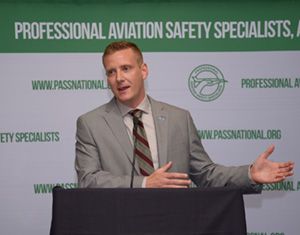 Attig, a combat veteran of the Iraq War, thanked members for their support of the Council and veterans nationwide. He then shared his personal story, one that is echoed throughout the country by veterans attempting to re-enter the workforce. He returned home in 2009 and, like many veterans, found very few job prospects because the economy crashed. “I went from being a hero to not having a job and a bleak future,” Attig said. On one of his worst days, he applied for a job loading soda onto a truck. “I thought I could handle that,” he told the delegates, “Two deployments in Iraq, and a Staff Sergeant and in charge of 14 people. I mean, I can handle it.” Unfortunately, the hiring manager required at least an associate’s degree, which Attig did not possess. “I was leading soldiers in combat and I was decorated with the Bronze Star of Valor, but I couldn’t get a job throwing soda pop on the back of a truck.”
Attig, a combat veteran of the Iraq War, thanked members for their support of the Council and veterans nationwide. He then shared his personal story, one that is echoed throughout the country by veterans attempting to re-enter the workforce. He returned home in 2009 and, like many veterans, found very few job prospects because the economy crashed. “I went from being a hero to not having a job and a bleak future,” Attig said. On one of his worst days, he applied for a job loading soda onto a truck. “I thought I could handle that,” he told the delegates, “Two deployments in Iraq, and a Staff Sergeant and in charge of 14 people. I mean, I can handle it.” Unfortunately, the hiring manager required at least an associate’s degree, which Attig did not possess. “I was leading soldiers in combat and I was decorated with the Bronze Star of Valor, but I couldn’t get a job throwing soda pop on the back of a truck.”
He found his way back through Helmets to Hard Hats, a labor-supported nonprofit program that connects National Guard, Reserve, retired and transitioning active-duty service members with skilled training and career opportunities in the construction industry. He is now a proud union member who continues to support his fellow veterans through his work with the Union Veterans Council. “We are trying to support a channel to build and educate our veteran population by going out in the states and working with the veterans’ programs that are already established and give our veterans support.” He commended PASS’s treatment of veterans in the workplace and the union’s strong backing of veterans’ hiring preferences in the federal government—something that would no longer be guaranteed if the air traffic control system is privatized.
He chastised politicians and lawmakers who claim to support veterans, but work to cut programs and protections that benefit the working class—many of whom are veterans. “If you do not support the working class, you do not support veterans,” Attig concluded.




